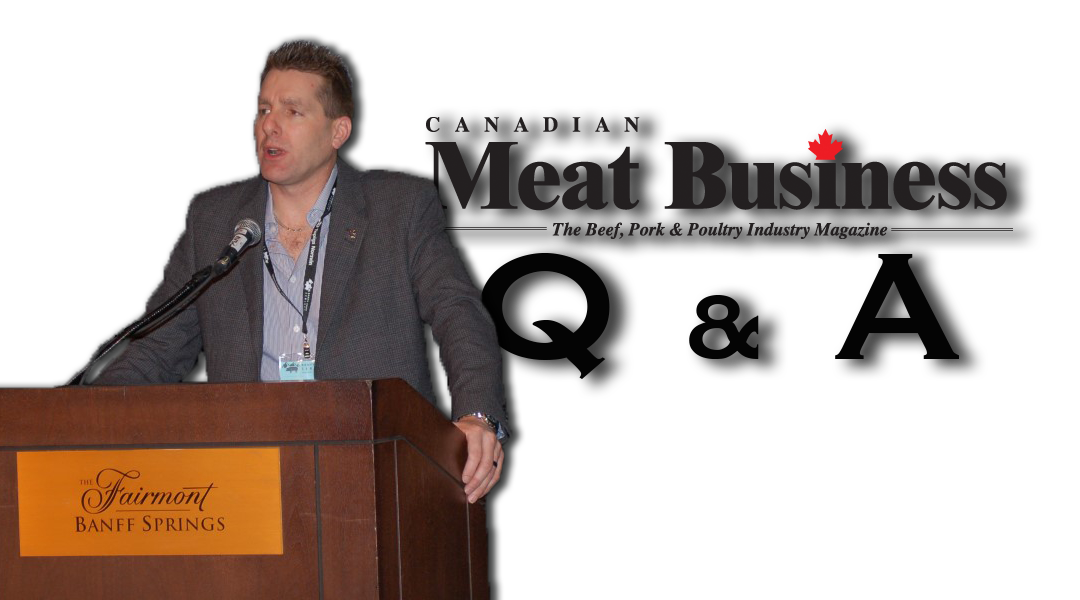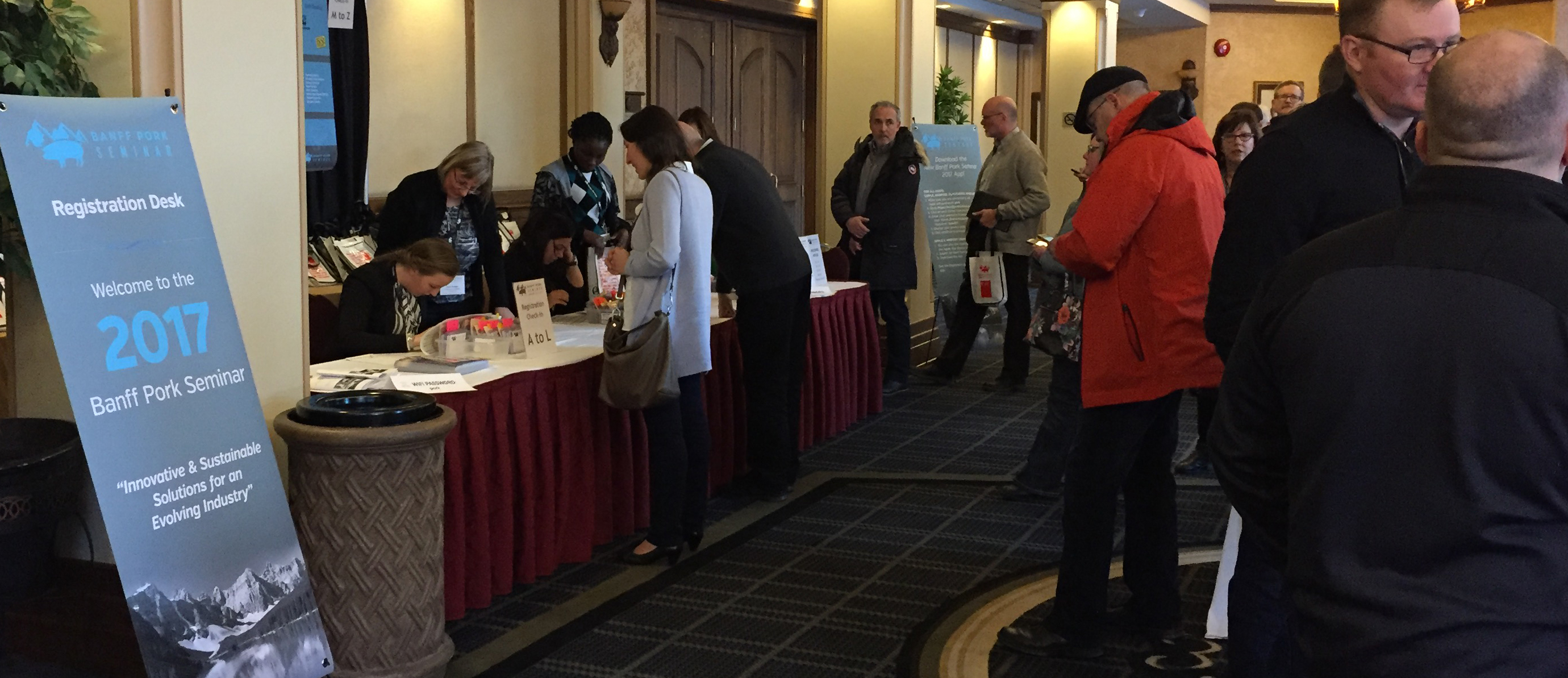The Banff Pork Seminar Overview with Mark Chambers

The Banff Pork Seminar has become one of the most anticipated annual industry events and this year’s conference held in January set the bar even higher according to Committee Chairman Mark Chambers
Attendance for the seminar has grown, attracting attendees from as far away as Asia, Russia, South America, Australia, and other pork producing countries around the world.
This year’s conference was supported by over 60 sponsors including such brand names as Maple Leaf, Canadian Pork Council, Alberta Pork, Swine Innovation, Olymel, and DuPont.
Canadian Meat Business had the opportunity to speak with Mark Chambers regarding the conference high points and what he sees as the important topics on pork producers’ minds going into 2017.
CMB: How did you become involved with the Seminar and what is your role now?
MC: I’ve been senior production manager for Sunterra Farms since I emigrated from England some 20 years ago now. I got asked if I would sit on the advisory committee four years ago. Sunterra has always been actively involved in the industry, so I was honored to be asked to do my part to be honest. It is a very prestigious seminar that has been around for 46 years. But this year was my first as chairman of the seminar. I feel somewhat fortunate since committee seats rotate every three years, but with the chairman role, I’ve got next year as well.
CMB: What changes have you seen in the Seminar since you started going?
MC: You know that’s funny because my opening comments this year spoke to that. I’ve been going since 1997 and I’ve gone to everyone since then. So that’s 20 years for me and it has grown from 260 attendees to around 680. That’s tremendous growth. We get people attending from all over the world including Asia, South America, Australia, Europe, so a very world renowned seminar.
CMB: With all that diversity and multiculturalism, what is the common concern you find?
MC: The concern that is always on the agenda is the economics. Our industry deals with strict commodities and the prices are set according to demand. Since that model is a similar system used through the world, it is a common primary issue every year. Another common theme is the pressure from humane groups forcing change. That’s not necessarily a bad thing but one of the latest issues is switching from gestation pens to loose housing. Europe has already adopted the concept because outside pressure resulted in legislation. We also have a lot of focus on feed and feed efficiencies; how we can get more from less because we’ve got a growing population to feed, yet only have the same amount of land. So the question is how do we maintain good stewardship of the land and good environmental practices without depleting natural resources while still feeding our ever-growing world?
CMB: Did you have speakers who addressed those issues this year?
MC: Yes, we had a couple really good plenary speakers this year. We had Sandra Vjin, director of the Sustainable Food Team of the World Wildlife Fun and Frank Mitloehner, Professor and Air Quality Specialist in Cooperative Extension in the Animal Science department at the University of California. Sandra addressed feeding the world in a sustainable manner and understanding that if we don’t want global malnutrition, we have to adopt modern technologies such as GMOs, getting more from an acre of land with new science. She talked how this in particular would have positive impact in third world countries where they’re able to grow crops now through the use of GMOs. We’ve got to better understand it and embrace it because unfortunately with a growing world population, malnutrition is inevitable. Frank spoke to the farming science side of the GMO question. They were our first speakers and were very well received because over the years, we know were going to have to continue to grow and produce more, so to get a perspective on sustainable GMO technologies is really good.
“We are going to continue the conversations that our important to our industry and move forward from there”
CMB: What were some of the other areas covered?
MC: We had a number of breakout sessions on transportation, swine health, productivity, better management of herd sizes and labor management.
CMB: I would think labor is a prime concern in the industry – especially for Canadian producers.
MC: Yes. I spend quite a bit of time on labor on the national level, working with government to get more people into the industry, including accessing overseas workers.
CMB: The Temporary Foreign Worker Program (TFWP) is a major source of frustration among pork producers I’ve spoken with.
MC: Yes, we’ve been back and forth to Ottawa over the TFWP and I do think we are making some progress. There have been some positive changes. For example we managed to get the four year rule removed so that helps. (After a four year term the worker had to leave the country).
CMB: With so many attendees from all parts of the world, trade must have been at the top of a lot of sessions.
MC: We had Steve Meyer from Express Markets Analytics and Kevin Grier who has his own market analysis and consulting firm. Their presentations focused on trade economics and how important it is to keep those markets open. They are always entertaining and Steve was using pig disease acronyms like PED and then he said “PT.” He kept the audience guessing then finally told them he was meaning “Post Trump”. That got a big laugh. The point really was, what is going to happen with Trump’s administration in regards to NAFTA? We don’t really know and there is concern because the U.S. is our biggest trading partner and we need open doors there.
CMB: The same goes for the European producers with respect to the CETA deal.
MC: Yes, for sure. Canada is an exporter market, so the deals we can get in Europe, Asia and South America are important because we don’t want to be left with discount markets to sell our herds.
CMB: Can we talk about the overall lack of industry marketing to the general public?
MC: We need to be enable to engage with the public so that our industry doesn’t always get such a bad rap. There are groups out there that are well organized and well funded and they seem to be able to connect with the public on a very emotional level and in the process, have managed to change the perspective of the pig farmer. We had Terry O’Reilly from the CBC give a lecture on “Changing the conversation.” He talks about how to connect with people, with your public. Right now it seems like the conversation is farmers are bad, so we need to connect with them to change the conversation to how we are trying to do the right thing and why we are doing the right thing. We also had Joe Schwarcz of McGill University who talked about countering misconceptions that the public have about modern agriculture. Joe was saying you can’t just show the public science because people shop with emotion.
CMB: Do you think the pork industry is doing enough to change that conversation and counter those misconceptions?
MC: You know you leave the conference thinking we got some great information, and good ideas, and expecting someone else to do it. As farmers or producers, we are very good at doing what we do, but were just not very good at the marketing side. I mean we market our product, but what we really need to do is market our story about how and why we do it. The opposition has managed to hit that mark and sell the idea that our how and why is a bad thing. There is a lot a work to be done on our story and maybe Terry O’Rielly should be the man to lead the campaign.
CMB: Even the transport side of the pork industry has been taking a lot of knocks.
MC: There are changes coming down the pipe now from the CFIA regarding transport times for different species. They’re shortening the duration that is allowable for animals to be off loaded and rested, fed and watered. So that is going to have an impact because we ship a lot of herds across Canada and deep into the mid-west. Historically the industry has moved the animals to where the feed is. As an example, a lot of Manitoba producers grow weanlings and ship them down to the mid-west because the grain is there. Slaughter is done there and the meat gets sold. So when you consider changing travel mandates, that could be impactful, forcing less trade and less movement of animals. The flip side of that is there has not been a lot of science put into transportation because we’re good at it. We typically transport weanlings long distances and our loss rate is less than .001 % over ten years. So the science says transport is absolutely sound but somebody, somewhere has decided it should change.
CMB: Can we touch on disease control talks at the seminar?
MC: There wasn’t too much talk about PED this year. Canada has done a very job of cleaning up the outbreak and eliminating it. However there was a lot of discussion about disease challenges with reduced antibiotic use. I think it’s good the issue has been brought to the forefront and discussed but I don’t think it should be phased out. In reality they should be used in areas experiencing disease pressure. The upside is there will be a lot more attention put on vaccines to prevent disease outbreaks.
CMB: What are some of the topics for discussion in next year’s Seminar?
MC: We will definitely be talking more about sow housing conversions because were mandated that by 2024 it has to be loose housing. The conversations about antibiotics is ongoing, and who knows what advances will come before next year’s event. From my perspective, I was really pleased with the turnout the overall event and it would be nice to see us maintain or grow our attendance. We’ve had a couple years in a row where it’s been fairly steady so that is definitely encouraging. I think one of the real wins we had out of this year’s conference is that we hit a home run with each of our four plenary speakers – they were outstanding. And we are going to continue the conversations that our important to our industry and move forward from there.
Cam Patterson – Canadian Meat Business












